On the 11th of May, 2022, the Nigerian Medical Association, Lagos Branch held her MAIDEN ANTI-QUACKERY SUMMIT, themed; “Medical Quackery in Lagos: The Elephant in the Room”. This hybrid summit – which brought together every medical and health allied associations in the nation – was set to address the effect of quackery on our system and discuss ways forward in mitigating them, especially in Lagos.
Quackery can be defined as giving false medical advice or medical treatment without appropriate training or scientific bases. A specialist in one field, managing an ailment outside the scope of his or her speciality can also be described as quack. For example, a OBGYN consultant carrying out a hepatobiliary surgery that he or she is not trained for, is a quack.
At the beginning of the summit, the local organising chairman – Dr. Olayinka Atilola and Chairman NMA Lagos – Dr. Adenekan Adetunji, during their welcome address and opening remarks, enriched the participants’ thoughts on the road map for a quack-free Lagos. With the Chairman, highlighting the causes of medical quackery as weak health care delivery systems, professional rivalry, playing-the-doctor syndrome and lack of political will, which all need our urgent action. Also, Dr. Olayemi Oke Osanyintolu – representing Dr. Ibijoke SanwoOlu, the Lagos state first lady – in her goodwill message commended this initiative of the association, while emphasizing on the needed synergy and efforts among medical associations and government to eradicate quackery in the medical profession. Likewise, accentuating solutions such as massive enlightenment of the public and the need to ensure legal actions are taken against culprits, so it serves as a note of warning.
According to the Chairman of the occasion, Dr Abayomi Finnih, some of the ways to curtail quackery – which have been tried in the past – is to continuously train community healthcare providers (under supervision) and educate the public on utilizing proper primary healthcare facilities, as opposed to visiting quacks for their healthcare needs.
During the speech of Lagos State Honorable Commissioner of Health (HCH) – ably represented by Dr. Tunde Ajayi, special assistant to the ministry of health, working in the office of the HCH – he explained the menace of quackery in Lagos and by extension in Nigeria using reported data as evidence. This, he linked back in time to people opting for cheaper services from people who do not understand the practice of medicine or even members of the medical fraternity (i.e. doctors) who do things they are not trained for or skilled to do, as opposed to actual physicians or trained specialist due to the consultation fee or cost attached. Asides this significant poor health seeking behaviour among patients, other causes mentioned were limited resources and capacity of regulators such as the apex licensing organizations.
He expatiated on the economic downside of quackery, which cuts across all sectors, citing an example of the pharmaceutical drugs supply chain in Nigeria. He revealed that the supply chain of drugs in the country as a whole and the biggest drug market in Lagos (at idumota) are not in the hands of pharmacists, doctors or even people who are formally educated about drugs and its distribution. Further highlighting that, If we – medical professionals – do not scale up to meet demands and the supply chain continues to go unmonitored, we would continue to make great potential losses and the bad market would continue to thrive, as there would always be a demand for it. Hence, we must be more active in politics to help us strengthen our regulations and think of our health system in Naira and Kobo.
In Lagos, there are currently about 4000 private facilities registered, 303 primary healthcare centres and 28 general hospitals. – Dr Tunde Ajayi
During the keynote lecture by Prof. Olufemi Adelowo titled, “medical quackery and the snake oil syndrome”, he stated that the nursing arm of the medical profession has the largest quackery. He further highlighted that quackery is hinged on desperation and capitalization, with a continuous cycle of push and pull, demand and supply, seller and buyer of quackery – giving the example of the regular supply of these quacks by places training them and the steady demand for their services by the large populace.
CAM (Complementary Alternative Medicine) is SCAM… while medicine prides in scientific evidence, CAM prides itself in testimonials and natural products. Quacks are very convincing and are very good salesmen, which unfortunately, the medical profession does not let us do… Doctors should not combine orthodox medicine with alternative medicine – Prof. O. O. Adelowo (Professor of Medicine and Consultant Rheumatologist)
For participation of every stakeholder present at the summit, there were up to 5 plenary sessions, each discussing the unique peculiarities of quackery to their profession and how it can be managed. Panel one had representatives of other medical doctors associations and examined the alarming huge problem of Medical quackery on the profession and society at large. On this panel, the Chairman of National Dental Association (NDA Lagos), represented by Dr. Bimbo Oyedokun gave the example of Ludwig’s angina as the hallmark of dental quackery in Nigeria, gotten from uncomplete extractions leaving behind an abscess and horrible oral health outcome. Dr. Makinde Akinlemibola (Chairman, Association of National Private Medical Practitioners) gave an insight of private practices seeing the crux of medical quackery consequences being pushed to them at their various facilities and what the public facilities see is just the tip of the iceberg. He cited the case of a health attendant setting up a healthcare facility and causing a patient to lose a limb to fasciitis gotten from injection site infection. Or the case of a decapitated baby referred from a quack posing as a medical doctor at another facility.
Some quacks practice under the guise of being medical doctors, but because MDCN is only in charge of practicing licensed doctors, these quacks are released after being handed over to the police. Therefore, advocacy must be carried out to solve the enforcement of law problems. – Dr. Makinde Akinlemibola
The Chairman, Association of Medical Officers of Health Lagos (AMOHN) – Dr. Babatunde Oshoba explained that countless issues of medical quackery are seen every day. We see it in instances such as blood transfusion being set up at home, or someone with head injury being managed at a maternity home. Some of his contributions were; our need for a road map of steps-to-destination would help us solve these issues – as well as improve our health system, sharing personal encounters, putting systems in place to enable people access care when they need them, also enhancing regulations/regulatory bodies to help healthcare providers comply and meet up to certain standards and not just make them pay (as a government revenue generating means) when they don’t meet those standard, would go a long way.
Also, the Chairman, committee on NYSC doctors (Dr. Sowade) clearly stated that quackery makes the job for actual health professionals more difficult and increases the cost of health care. Further explaining that, even among House Officers and Corper doctors, the system encourages quackery by putting them in roles to solely carry out activities they are not meant to do without supervision. She then advised that for NYSC doctors, MOHs introducing them through proper community entry would help improve their quality and quantity of healthcare provided. Likewise, during residency, senior colleagues must always keep an eye on their trainees. Instead of frustrating a resident doctor out of training because they are labelled “not trainable”, we should put systems in place to support them and ensure they are trained to expertise. Because, if this is not done, and they are pushed out of training, they go out with their basic knowledge and uncompleted expert training to open a clinic, where quackery can be continued and would now cannot be supervised. She also emphasised on our need to sieve quackery out among fellows, learn to know when to refer – not “sit” on patients – and give appropriate referrals.
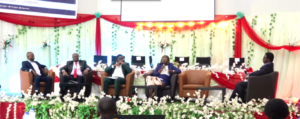
The second plenary session was an extension of the first, with more frontline healthcare professionals discussing the peculiarities and effect of medical quackery to their profession. On this panel, the Chairman, National Association of Nigerian Nurses and Midwives (NANNM), Lagos branch (represented by Mr Eda Badejo) explained that the high prevalence of fake and auxiliary nurses is the major reason why the nurses and midwives are more affected by quackery, and despite the many steps being taken by the Nursing and Midwifery Council of Nigeria (NMCN) to nip this issue, it appears to just keeps increasing. He also gave an example of a case being handled by NMCN and the nurse currently facing the disciplinary committee because he performed a fibroid surgery which is not within the nurses jurisdiction. He then urged all healthcare professionals that “in the spirit of one-health”, we must all work together and ensure everyone contributes his/her own quota by refraining from looking for cheap labour to maximise labour and confirming that our healthcare staff have the required licence needed to practice in their field. He also commended the role of the Health Facilities Monitoring and Accreditation Agency (HEFAMAA) in fishing out quacks and regulating private practices in Lagos.
Likewise, Mr Clement Olaifa – representing the Association of General and Private Nursing Practitioners (AGPNP Lagos) – emphasized on the beginning and proliferation of quackery in the nursing profession. Further, bewailing the Lagos law for not really helping to curb this quackery because it gives an opening to “anyone” to be able to own a facility, so far they can employ professionals, and this shouldn’t be so – as some only employ professionals for registration processes. Some facilities don’t even know the so-called doctors they employed are quacks. Also, after petitioning a facility for quackery, it still continues to exist and operates, what then is the way forward and where do we – as healthcare professionals – go from here?
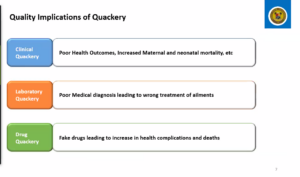
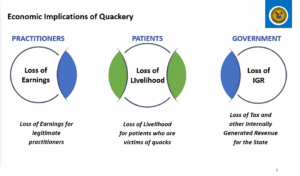
Still on the same panel, the Chairman, Association of Medical Laboratory Scientist of Nigeria (MLSN) – Comr. Olumide Fadipe – asserted that, “how committed we (healthcare providers) are to truth will determine the success of this summit. If we must come to equity, we must come with clean hands, because every profession has its bad egg, and that entity is a reflection of the society. So, we must own up and not trade blames…”. He further led the discussion towards the root cause of quackery, which was in the direction of querying how quacks get the knowledge to do those things they are not qualified to do.
Dr. Leo representing the Chairman, Guild of Medical Laboratory Directors, Lagos state, in the same vein highlighted that the Medical Laboratory profession is the most hit by medical quackery, because even clinicians are found dabbling into it. He also stressed on the issue of the government continually training science laboratory technicians (especially through internships in government hospitals), but after graduation they would not employ or absorb them into the system, thereby shunning them out into the private practice pool to proliferate quackery by posing as medical laboratory technicians, assistants or scientists. He, however commended the effort of Medical Laboratory Council of Nigeria (MLSCN) with their available and functional standard frame work towards curbing quack activities in the profession, reporting to HEFEMAA and ensuring close down such culpable facilities.
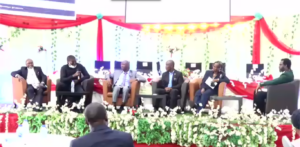
Likewise, Mrs Tope Oduwole – Chairman, Association of Radiographers of Nigeria (ARN Lagos State) – urged participants that, for one profession not to ridicule the other, we all have to be professional for better teamwork. She encouraged more advocacy to ensure that every professional does not go beyond their limits and channels of reporting should be ensured for proper annual licensing. She also stated that licensing issues among radiographers are taken seriously and any erring radiographer can be reported to the registration board for disciplinary actions.
On the third plenary session, other frontline healthcare providers as well discussed enforcement and understanding boundaries. During this session, Dr. John Samsedi – Chairman of the Nigerian Optometry Association, Lagos state branch – stated that policies must be written out and followed through to see its benefits. Also, according to him, “Ignorance is a communicable disease that can be passed from one generation to another. A lot of quackery is ongoing in the eye care sector, beyond carrying around optometric boxes, but we try to ensure regulation with the police and HEFEMAA”.
Mrs Aboyade – Chairman, Community Health Practitioners Lagos State Board (CHPLSB)– likewise reiterated that community health practitioners (which comprise CHOs, CHEWs & JCHEWs) work with standing orders to know their limitation, as they were created and are trained to reduce waiting time of patients at facilities by triaging and taking care for mild illnesses, e.g. diarrhoea. She also stated that the CHP licence is usually valid for 2 years and they are always encouraged to go around with it for identification purposes. She then appealed to HEFEMAA to join their platform for up to date information.
Community Health Practitioners (CHPs) include Community Health Extension Workers (CHEWs) – who study for 3 years in school, Junior Community Health Extension Workers (JCHEWS) – who study for 2 years, and the Community Health Officers (CHOs) – who study for 3 years in their health colleges + an additional 1 year study in the university and all write their national licencing exam to limit quackery. Currently, there are over 700 CHPs in Lagos, and the CHOs are also in charge of the communities traditional birth attendants (TBAs).
Also, representing the TBAs on this panel was Dr. Alexander and Prof. A. Oshitelu (Chairman, Lagos State Board of Traditional Medicine Practitioners), who emphatically stated that, “people need to change their attitudes towards traditional medicine. Instead of looking down on them, we can upgrade ourselves like the western world”. She then highlighted their activities within the board to supervise the traditional medicine practitioners. She explained that, “We ensure advocacy and sensitization to the Obas and Baales in communities, emphasizing and enforcing that no one among them is permitted to treat anybody medically, if they are not licensed”. She further listed their training program which allows them to attest and belong to an association, this includes 6 weeks of compulsory training for general practice, another 6 weeks of immersion in general hospitals for TBAs, plus another 8 weeks of training in the Lagos state school of health education. After which they are certified, continually upgraded, regulated and monitored to avoid free hands for quackery.
The fourth Panel 4 discussed the regulation of professional practices in the healthcare space and how agencies have thrived in this space. Participants for this session included representatives of the Nursing and Midwifery Council of Nigeria, the Pharmacists Council of Nigeria (PCN), the Registrar, Medical Lab. Scientists Council of Nigeria, the Director of Medical Services, Lagos state, the Executive Secretary, Lagos State Blood Transfusion services (LSBTS), the Executive Secretary, HEFAMAA and the Registrar, Community Health Practitioner of Nigeria. Existing laws and frameworks that define who a quack is within the confines of a profession and the law towards tackling quackery, was as well discussed.
The last panel which brought together legal practitioners and law enforcement agents to discuss the current state of law enforcement concerning quackery. A representative of the Lagos State Ministry of Justice (Office of the public defender) clarified that there is no designated court(s) for quackery at the moment and that a court of law is the deciding body for any individual accused of quackery. Elaborating on this, another legal practitioner on the panel – DPP – confirmed that, a quack is a criminal guilty of various offences ranging from impersonation (punishable with up to 7 years of imprisonment under the law), to manslaughter or murder resulting from their grievous act – that led to unjust termination of a life. Likewise, the barrister stated that medical negligence and lack of compassion (i.e. empathy) from any medical practitioner should be termed as quackery. He then advised that a legal framework and explicit law on quackery with stated punishment be worked on, as such issues in the health sectors are currently not under the exclusive list of national laws, but can be created under the jurisdiction of the state.
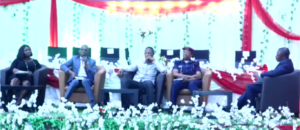
Other advice from the Nigerian Security and Civil Defence Corp (NSCDC Lagos) representative was for a combined effort towards sponsoring bills needed to fight this menace legally. She further urged healthcare professionals to shun greed, reduce tuition into medical colleges and break bureaucratic bottlenecks in accessing care. While the Commander, Lagos State Neighbourhood Security Corp (LNSC) (represented by Mr Falana Adeboye) called for a role extension for their organisation, as arresting is currently not in their job description. This would enable them to join the HEFEMAA crusade team as security and be able to carry out arrest or evict offenders (quacks) from facilities for proper legal consequences.
Conclusively, via online participation the HCH – Prof. Akin Abayomi – quickly lent his voice to the summit, by assuring all associations and participants present, that the aim of the summit is in keeping with the government plans and the ministry is in full support of all endeavours to make sure everyone is on the right trail; which would be backed up by policies, guidelines and strategies to protect the population and ensure that people who are duly trained to practice are not threatened. He also expressed his pleasure that the summit and impactful resolution to tackle quackery was coming from the community and medical professionals themselves.
Note: The NMA Lagos Antiquackery Summit Brochure can be viewed and downloaded here.
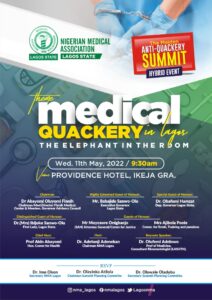
About Author:
Mary Oluwakemisola Agoyi is a medical doctor with a background in journalism and vast experience in global health research, academic writing, and content creation. With over 7 years’ experience in writing, reporting, editing, managing and contributing on various national and international medical/health-related publication committees, platforms and organisations; She believe that proper medical documentation and communication across all levels and sectors is key for sustainable development in the health sector and beyond.

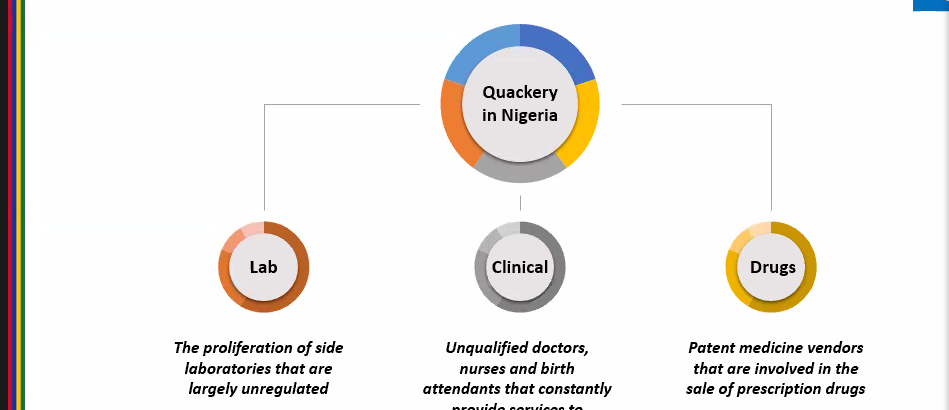
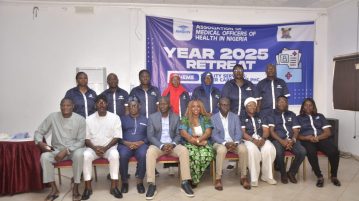
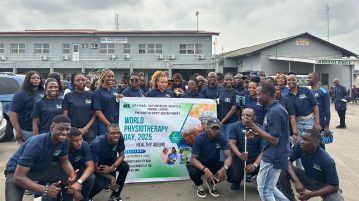
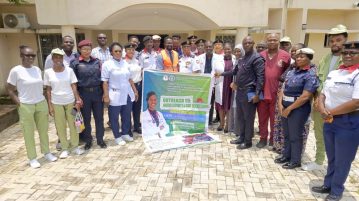
Discussion5 Comments
All I see in the Nigerian sector as a whole, is a medical ischaemic practice perpetrated by elders within the professions. Although series of debates have been going on about the declination of medical practices and decadence amongst practitioners, it is being fueled by the Professors, consultants and scholars of the old whom have considered the humanitarian practices as a strategic business and political environment.
This pungent practices now serve as a baseline for the newer generations, making the health sector the least recognized in the Nigerian Jurisdiction. Privatization has become the trending standards where a non-specialist sustains the freedom of performing an inappropriate management scheme.
Personally, I am bored of these strategic analysis. Conferring a solution seem like a futile search as these practice of quackery transcends cancerously beyond repair. Perhaps there is hope in recent generation of health practitioners…..just perhaps.
Very good and interesting please am looking forward to work and support the moving train
Pingback: World Pharmacists Day 2022: Pharmacists Urge Colleagues to be Authentic
Pingback: The Nurse and her Auxiliary: A Doctor’s and Private Practitioner’s Perspective
Pingback: NOA swings to Action and Calls for Regulation of Illegal Eye Care Outreaches by Fake Practitioners across the Nation